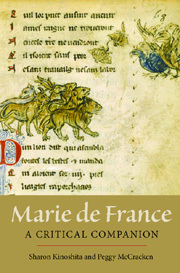Book contents
- Frontmatter
- Contents
- Preface
- Note on Editions
- 1 Introduction: the World of Marie de France
- 2 Communication, Transmission, and Interpretation: Literary History
- 3 Courtly Love and Feudal Society: Historical Context
- 4 Movement and Mobility: Plot
- 5 Bodies and Embodiment: Characters
- 6 Repetition and the Art of Variation: Narrative Techniques
- 7 Posterity: The Afterlives of Marie's Works
- Further Reading
- Index
- Already Published
5 - Bodies and Embodiment: Characters
Published online by Cambridge University Press: 12 September 2012
- Frontmatter
- Contents
- Preface
- Note on Editions
- 1 Introduction: the World of Marie de France
- 2 Communication, Transmission, and Interpretation: Literary History
- 3 Courtly Love and Feudal Society: Historical Context
- 4 Movement and Mobility: Plot
- 5 Bodies and Embodiment: Characters
- 6 Repetition and the Art of Variation: Narrative Techniques
- 7 Posterity: The Afterlives of Marie's Works
- Further Reading
- Index
- Already Published
Summary
Marie de France's works mobilize characters who seek love and adventure, learn to appreciate the safety of home, and undertake the physical experience of a spiritual journey through Purgatory. In all of Marie's texts, characters experience the world through their bodies. Each work also includes an exploration of the values of embodiment. Marie uses forms of embodiment to point to categories of identity – beauty is a quality of noble status, for example. But bodies are often changing and changeable in Marie's narratives, and the values associated with forms of embodiment may also change or come into contact with each other. In this the poetics of embodiment is similar to the narrative use of place and movement we examined in Chapter 4. But whereas in Marie's representations of mobility characters encounter different values, in her thinking about embodiment, they inhabit them. The difference is crucial for this chapter's shift of focus from plot to character. In Marie's works, characters experience the world through their bodies.
Each of her works draws on a different literary tradition for its representations of embodiment. The Lais use the conventions of beauty in courtly literature to imagine noble courtly bodies whose primary characteristics are beauty and prowess. They also represent marvelous creatures drawn from or inspired by Celtic folklore. The Ysopë follows Latin fable collections in using animal embodiment in the service of didacticism. Popular and learnèd understandings of how souls inhabit bodies structure the journey through the Christian otherworld that reveals the embodied suffering of human souls tortured by demons in the Espurgatoire seint Patriz.
- Type
- Chapter
- Information
- Marie de FranceA Critical Companion, pp. 143 - 172Publisher: Boydell & BrewerPrint publication year: 2012



